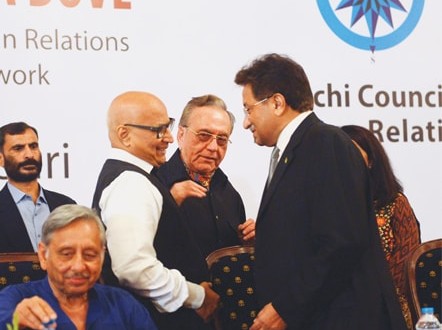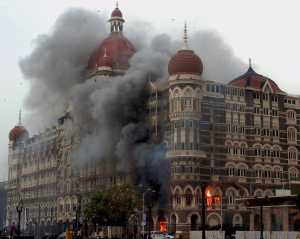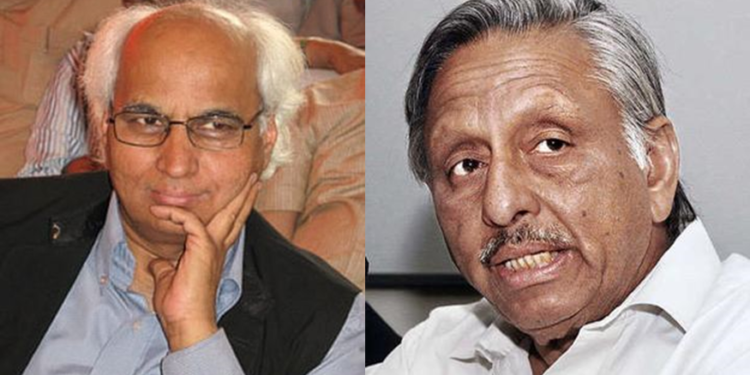
A handful of Indians knew who Sudheendra Kulkarni was, before he was thrust into our drawing rooms by media following Shiv Sena’s ink attack. Mani Shankar Aiyar, is slightly better known as an eccentric hardcore loyalist of the Gandhi family, who too dominated headlines when the man he called a Chaiwallah, ended up as the country’s PM. While Aiyar is an out and out Congressi, Sudheendra Kulkarni tried to be a BJP ideologue, who courted Vajpayee and Advani, before the latter’s Jinnah was Secular remark, edged both the master and the protégé into political wilderness. The two, Aiyar and Sudheendra Kulkarni, therefore made a strange team when they apeared alongside the likes of Khurshid Mahmud Kasuri, ex- Foreign Minister, Pakistan and General Pervez Musharraf, ex-Military Dictator, Pakistan. The subject that brought these distinguished people together was the launch of Kasuri’s book “Neither a Hawk nor a Dove” in Karachi.
In an audience, composed of the who’s who of Pakistan’s establishment (both literary and otherwise), and a sprinkling of Indians as well, Mr. Sudheendra Kulkarni had this to say about the Kashmir issue “Kashmir is indeed a core issue between India and Pakistan. Especially, we in India should not beat around the bush, and it must be resolved to satisfy long suffering people of Kashmir”. Mr. Aiyar, also added his 2-bits to the gathering by saying “I am looking forward to the Congress coming back and for good sense to prevail”. And that is not it, Mr. Sudheendra Kulkarni, also sought to cock a snook at the Shiv Sena, seeking verbal revenge for the ink attack against him by saying, “I met Hindus at Swami Narayan temple and I met Marathi-speaking people, and they all claimed to be proud Pakistanis”. I guess the eminent Indian panelists, after deciding that they had done enough to highlight intolerance in India, and show India the place it truly deserved, departed.

There is a lot of brouhaha on the growth of intolerance in India since the last year or so. Has India become intolerant suddenly, or is it that people are trying to deliberately and continuously fire passions and play with sentiments, so that when there is a response, it can show the rising intolerance in the country? Mr. Sudheendra Kulkarni says that we must satisfy the long suffering people of Kashmir. Why is there suffering? Is it because one fine day, India decided to send its forces into Kashmir to wreak havoc on the land and its people. Or is it that there was a war of secession, funded and armed by the neighbour, who Sudheendra Kulkarni is now trying to woo, that forced the Army’s hands? Sudheendra Kulkarni sees the suffering in Indian Kashmir and chooses to sweep the protests rocking Pakistan occupied Kashmir. Sudheendra Kulkarni has woven a narrative of right and wrong that is unmindful of reality and is bereft of a sense of history. Pakistan wants Kashmir not because it is Muslim. Had “Islam” been the unifying bond, Bangladesh would never have been born. Pakistan wants Kashmir, because it can fulfill the unfinished agenda of partition. That agenda is to splinter India into pieces once and for all. When Sudheendra Kulkarni talks of the Marathi speaking people in Karachi temples, does he realize he is speaking to the handful of Hindus in Pakistan, who probably would take the first flight out to India, if they could? Does he realize that in Sindh, Hindu girls are being abducted and converted and Hindu parents are left begging for justice? Probably, Sudheendra Kulkarni ‘s Aman-pasand, secular, hyper-liberal mind cannot fathom these details. The likes of him will celebrate Diwali the day Pakistani forces enter Srinagar and free the enslaved people of Kashmir.

On the other hand, we have Mr. Aiyar. Mr. Aiyar belongs to the past. Like Sudheendra Kulkarni, he has built an alternate narrative of the past. In his mind, India was “Sone ki Chidiya”, when a Nehru-Gandhi was at India’s helm. There was no corruption, no civil strife, no caste violence when Gandhis and Nehrus ruled India. India was utopia, with milk laden rivers and fruit bearing trees all around. The cataclysmic loss that Congress faced in 2014, therefore, is nothing less than a personal catastrophe for Aiyar. It is not that India has become intolerant. It is that Aiyar’s eyes are blinded with cataract, making him see dark, where no darkness exists. It is in this light that Aiyar eagerly awaits the return of a Congress dispensation to resolve the Kashmir issue. Just like they did in 1947, or 1965, or 1971, or during every single second of their 6 decades of rule. I do not want to castigate Aiyar any further. He is anyways a lost cause. He has drifted too far into a neverland from where it is impossible to fetch him back. My only hope is that he keeps his dreams to himself.
Why should one not call these two gentlemen traitors? Did they, not for a moment, felt ashamed that they were sharing the dias with a man who had only a decade ago planned the Kargil war? Did they not hear Kasuri say that he had led Pakistan’s efforts in exporting terrorism in India? Have they forgotten 26/11, Mumbai train bombings, Varanasi temple attacks, Delhi temple strikes, and countless other outrages that have killed thousands of their countrymen. Liberals may argue that you cannot call some one a traitor for merely speaking their mind. That is indeed a valid point. If we were to start calling everyone who has a point of view different from ours, a traitor, we will be no different from a Pakistan or a Somalia. But the point is, those who speak their mind, should be mindful of the past and the present. Their points of view should have a sense of reality. One cannot weave fantasies and call them a “different point of view”, and then claim the right to free speech as well.

I am beginning to feel that Shiv Sena’s ink attack was not entirely misplaced.




























